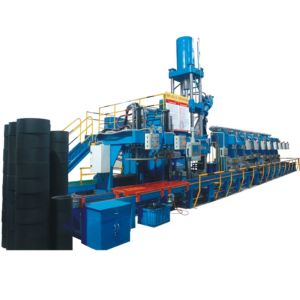As leading solid tyre production line manufacturers, we specialize in providing state-of-the-art solutions that allow businesses to transition seamlessly from manual to automated solid tire production operations. Our Press-on Solid Tyre Rubber Production Line exemplifies how automation can dramatically enhance efficiency, reduce costs, and improve product quality.

The Benefits of Automation in Solid Tire Manufacturing Process
The transition from manual operations to automated processes offers numerous benefits that significantly impact production lines. First and foremost, automation increases productivity. By integrating a fully automated solid tire production line into the manufacturing process, businesses can achieve higher output rates with less labor involvement. For instance, our advanced tire making machine can manage multiple tasks simultaneously, resulting in faster cycle times and improved overall efficiency.
Additionally, automation enhances precision and consistency in manufacturing. With manual processes, there’s always a risk of human error, leading to inconsistencies in product quality. Automated rubber production lines, like those offered by DEKUMA, utilize sophisticated controls and sensors to ensure that every rubber product is produced to exact specifications. This not only improves the final products but also boosts customer satisfaction and reduces material waste.
Key Features of DEKUMA’s Automated Solid Tire Machines
As one of the top solid tire making machine manufacturers, we ensure that our machines are equipped with the latest technologies to support automation. Our Press-on Solid Tyre Rubber Production Line features a multi-station setup that allows for the production of various tire sizes within a single unit. This flexibility minimizes changeover times and maximizes output efficiency.
Moreover, our tire production machines come with advanced mold conveying systems, which streamline the workflow and eliminate bottlenecks common in manual operations. By automating the loading and unloading of molds, we help businesses maintain a continuous flow of production. This efficiency is crucial for meeting high-volume demands while ensuring consistent quality across all products.
Steps for Successfully Transitioning to Automation
Transitioning to an automated press-on solid tire making system involves several strategic steps. First, conducting a thorough assessment of current operations is essential to identify inefficiencies and areas for improvement. Next, selecting the right tire making machine that meets specific production needs will set the foundation for successful automation.
Training employees on the new automated systems is also vital. At DEKUMA, we offer comprehensive training programs to ensure that teams are well-equipped to operate and maintain our machinery effectively. Continuous monitoring and evaluation are essential after implementation to identify any areas needing adjustment, ensuring optimal performance from the automated systems.
Conclusion
In conclusion, transitioning from manual to automated tire making machinery presents a tremendous opportunity for rubber manufacturers to enhance efficiency and product quality. At DEKUMA, we are committed to being your partner in this transition, providing innovative solid tire machines equipped with cutting-edge technology. By embracing automation, businesses can streamline their operations, reduce costs, and remain competitive in the ever-evolving market. Trust in DEKUMA’s expertise as leading press-on solid tire making machine manufacturers to guide you towards a more efficient future in rubber manufacturing.
